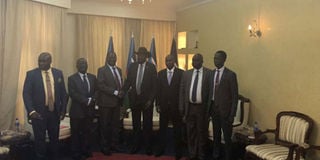Riek Machar's group happy with Raila’s role in South Sudan peace talks

ODM leader Raila Odinga (third left) with South Sudan President Salva Kiir (fourth right) in Juba, last week. PHOTO COURTESY | NATION MEDIA GROUP
What you need to know:
- Mr Odinga held a seven-hour meeting with President Kiir, in what seems to usher in his role as an African Union special envoy.
- Mr Odwar and a team of negotiators leading the efforts to find a lasting solution were in Nairobi on Sunday to brief the South Sudanese living in Kenya on the progress of the negotiations.
- The deliberations are happening in Addis Ababa, Ethiopia under the guidance of the Intergovernmental Authority on Development council of ministers.
The splinter group led by former South Sudan Vice-President Riek Machar has welcomed Kenya’s move to use opposition leader Raila Odinga in negotiations for peace in the troubled nation.
But the group also insisted that Dr Machar, who is in South Africa, should be released and allowed to sit in the talks. They have said that this would reduce the time needed to bring calm to South Sudan.
“We are aware that Raila met President Salva Kiir in Juba, and we are looking forward to a meeting with Dr Machar too. We hope that this initiative is further helped by Kenya by authorising Raila to try and bridge the gap,” Mr Henry Odwar, the lead negotiator from Dr Machar’s side said.
Mr Odinga held a seven-hour meeting with President Kiir, in what seems to usher in his role as an African Union special envoy, and an official representative of Kenya in the negotiations to end the civil strife in South Sudan.
Mr Odwar and a team of negotiators leading the efforts to find a lasting solution were in Nairobi on Sunday to brief the South Sudanese living in Kenya on the progress of the negotiations.
VIOLENT MAN
He was accompanied by former minister Mabior Garang’ and Angelina Teny, the party’s chairperson of the Security and Defence Committee.
“They are saying he (Dr Machar) is a violent man. How, then, could he have formed this committee to negotiate peace? He should be released to shorten the process of the peace talks. We have taken a year now, and we are not making much of a headway,” said Mr Odwar.
He called on Kenya, as well as other neighbouring countries to support the calls for Dr Machar’s release, and his active involvement in the search for peace.
The deliberations are happening in Addis Ababa, Ethiopia under the guidance of the Intergovernmental Authority on Development (Igad) council of ministers.
The high-level team has proposed that Mr Kiir and his allies — such as First Vice President Taban Deng Gai — will retain a massive control of the transitional government with a 55-per cent stake.
REBELS
The rebels, under Mr Machar, who is still under House arrest in Pretoria, will control 25 per cent while the splinter groups under the South Sudan Opposition Alliance will take 10 per cent.
Igad also wants South Sudan to tinker with its current legislature, expanding the number of MPs from the current 400 to 440 in the transitional stage, before reverting to the 332 that was there in 2013.
On Sunday, Mr Odwar reiterated their stand on rejecting the proposal. Mr Odwar also opposed the bid to expand the presidency to create three vice-presidents, and assistant presidents.
“They want to dilute our interests, and make sure that power only stays in the presidency. We want the government side to retain the presidency, we be given the first vice-president, and then the other opposition groups produce the second vice-president. I think that is the middle ground,” he said.
LEAN GOVERNMENT
But the government has rubbished calls for a lean government, saying a broad executive was the only way to ensure inclusivity.
“Since the fight in South Sudan is all about power, let us save lives of our people by bringing all the power seekers on-board, fix the transitional period and go for democratic elections at the end of the transitional period,” said Mr James P Morgan, South Sudan ambassador to the African Union.
The Machar side wants a 40-40 share of government with the Kiir side, with the other groups splitting the 20 per cent. They want the same deal replicated in the military.




